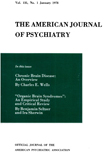SPEECH IN SENILITY
Abstract
The speech of psychotic senile patients was analyzed grammatically, and compared with that of normal adults and children. Pronouns, verbs and adjectives display the most prominent differences between the senile and the normal subjects. Pronouns are used relatively more often in seniles, verbs also more often, and adjectives less frequently. The implications of these differences are discussed.
Access content
To read the fulltext, please use one of the options below to sign in or purchase access.- Personal login
- Institutional Login
- Sign in via OpenAthens
- Register for access
-
Please login/register if you wish to pair your device and check access availability.
Not a subscriber?
PsychiatryOnline subscription options offer access to the DSM-5 library, books, journals, CME, and patient resources. This all-in-one virtual library provides psychiatrists and mental health professionals with key resources for diagnosis, treatment, research, and professional development.
Need more help? PsychiatryOnline Customer Service may be reached by emailing [email protected] or by calling 800-368-5777 (in the U.S.) or 703-907-7322 (outside the U.S.).



